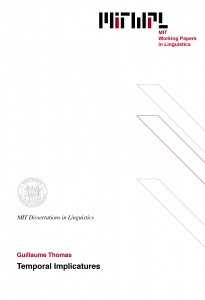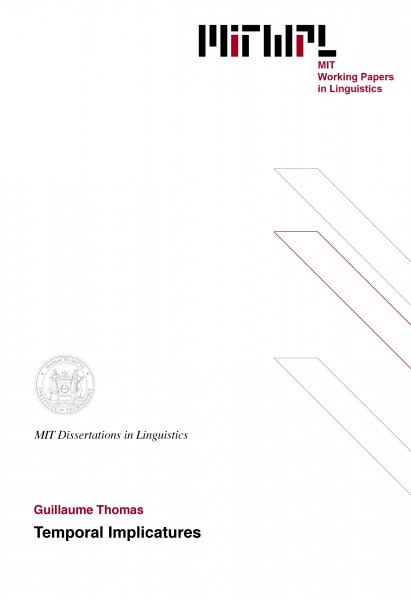Temporal Implicatures
Guillaume Thomas, 2012
This dissertation proposes a theory of temporal implicatures, and applies it to the study of tense in Mbyá Guaraní. It is composed of two parts. In the first one, I discuss the analyses of temporal implicatures developed by Musan (1995, 1997) and Magri (2009). Although I argue in favor of Magri’s (2009) analysis, I reject two aspects of his proposal: that tense is universally or generically quantified in individual level sentences, and that the present tense is vacuous (following Sauerland 2002). Building on the semantics of tense presented in chapter 2, I propose a revision of Magri’s analysis in chapter 3, which integrates Katzir’s (2008) theory of structurally defined alternatives, and relies on a more conservative non-vacuous analysis of the present. Sauerland’s (2002) arguments that the present tense is vacuous are criticized in chapter 5. In the second part of the dissertation, I study the expression and interpretation of tense in Mbyá. Like its close relative Paraguayan Guaraní, Mbyá has two temporal morphemes -kue and -rã that can be used either in clauses or inside noun phrases. However, the nominal uses of -kue and -rã license inferences that are not attested in their clausal uses. This lead Tonhauser (2006, 2007, 2011b) to argue that the nominal uses of -kue and -rã are not tenses, and that Paraguayan Guaraní is a tenseless language. I challenge both of these claims in Mbyá. After presenting a descriptive overview of the expression of tense in Mbyá in chapter 6, I argue in chapter 7 that -kue in its clausal uses is best analyzed as a relative past tense, and -rã as a future oriented modal. I conclude that Mbyá is not a tenseless language. In chapter 8, I propose a unified analysis of nominal and clausal uses of -kue and -rã. I argue that the special properties of their nominal uses are due to the interaction between temporal implicatures and independently attested presup- positions of noun phrases. I show that these temporal implicatures are also attested in clausal uses of -kue and -rã, although they are obligatory in their nominal uses, while they can be blocked in their clausal uses. I propose an explanation of this contrast.

